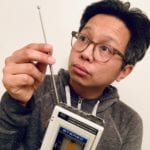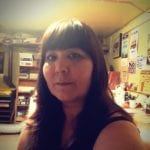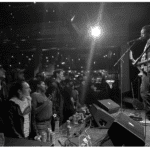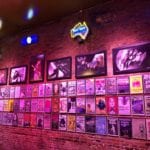VivaCity: Keep Music Live
A Brief Introduction
Keep Music Live (KML)
Keep Music Live WA is a COVID-19 relief fundraising campaign established by music lovers to support our small, independently owned venues in Washington State.
Tomo Nakayama (TN)
 Born in Japan and raised on Seattle’s “east side,” Tomo Nakayama is a UW alum, a singer-songwriter, and a producer who has been playing live music in Seattle for over 20 years. “I’ve played in practically every venue in town, from the smallest bars to the Moore Theatre and The Showbox, and I’ve met most of my best friends playing around town at shows.”
Born in Japan and raised on Seattle’s “east side,” Tomo Nakayama is a UW alum, a singer-songwriter, and a producer who has been playing live music in Seattle for over 20 years. “I’ve played in practically every venue in town, from the smallest bars to the Moore Theatre and The Showbox, and I’ve met most of my best friends playing around town at shows.”
Leigh Bezezekoff (LB)

Born in New Mexico and raised in a suburb just south of Seattle, Leigh is a fellow UW alum and staple at the Tractor Tavern in Ballard. “I pretty much learned there was a music scene here in Seattle when I saw Pearl Jam’s Even Flow video and I was like ‘This is happening here!? In Seattle?’ And from that moment on I started going to shows, then I moved to Seattle proper, and I’ve been here ever since!”
Michael Gill (MG)

Michael Gill hails from Montana originally. When he moved to Seattle in 2013, he started working odd jobs at Chop Suey because bands that he had played in touring out of Missoula always had great experiences there. “When I moved here, I hit them up and was like ‘can I wipe tables or clean up puke or something?’ Then, after some time, I was offered a job at the Central Saloon and I started talent buying there.”
Historic Seattle’s mission is to save meaningful places that foster lively communities. How do you think live music fosters community?
TN: The music itself is just one of the elements of what goes on at shows. It brings so many people together, and the experience of live music just can’t be recreated online. I’ve been playing Zoom meetings for the past year and it’s made me realize just how much I miss the organic relationships that form from being in the same room as someone. I miss the opportunities for different collaborations, the inspiration from seeing other people and being creative and that’s really something you can only get from being in a room with other people.

A 2019 show at the Tractor Tavern from Leigh Bezezekoff’s Instagram account @everyconcertigoto.
LB: Before I started officially working at the Tractor, I managed bands that played there a lot and I was there so much that by the time I started working there I already knew everyone! It’s the type of community where even if you go to a show alone, you know you’re probably going to know some people there. And I think this is an important part of what we are all missing, not just your immediate and closest friends, but the people you are just used to seeing all the time.
MG: You know, I see this a lot at the Central Saloon because of our geographic location. We really are at the center of so many things — in proximity to the stadiums and the waterfront, and you just get so many different communities coming together in the space purely because of music.

Pioneer Square’s Central Saloon. Image courtesy of Michael Gill.
Why do independent venues matter to you, and why is it important that they continue to exist?
TN: Independent venues aren’t driven entirely by commerce. What you get with the bigger conglomerates is sort of a built-in hierarchy of bands, and what happens in that case is you get the same type of music getting booked and getting promoted over and over again. You need these smaller venues, to foster creativity and for people to take chances with your music. And there are so many people involved in the music industry aside from the artists themselves – there are the sound engineers, lighting, the people who run the venues – they all rely on this ecosystem to keep our industry going. When people think of Seattle music and the character of the city, that’s what you’re talking about — the independent places, and the independent experiences – they differentiate it from a corporate conglomeration.
LB: Smaller venues have the ability to help artists grow their careers. From local artists building momentum to get on the road to helping touring artists build their fan bases in each market. I love that the Tractor will book an artist at The Sunset or even Conor Byrne and help them get ready for a bigger room. We’ll even help promote them at Neumos or The Showbox to help the transition.
MG: Independent venues are why many people start playing music, to have an emotional connection with the audience. The further you get from a small venue, the further you get from that direct connection. No matter how many people hold their lighters up in a stadium, you’re just not going to get that same experience that you do in a small venue. When music matters most is when it’s at a small venue. The reason it’s important for them to continue to exist is the same reason why they exist in the first place — bands need to grow from somewhere. Small venues offer the chance for discovery – for both the patron and the artist.
How has KML changed the relationship between venues, artists, and people in the industry?
LB: The Seattle music industry is pretty small when it comes down to it. We all kind of know each other and we’re all just one or two degrees away from one another in the scene, but what has been unique about this is that we have been developing relationships – strong foundational relationships of working together on behalf of everyone else and not just our own venues. I think everyone in the group kind of recognizes that if you were just out for yourself (as a venue) you might make it, but the important thing is to make sure that everyone else is coming along. That’s something I’ve not seen in Seattle before. Another thing is the coming together of people who have been ancillary in the venue scene, like Holly Hinton who curates music for Starbucks. She’s on the Keep Music Live leadership team and getting to work closely with her and other people from different facets of the industry has been amazing.
MG: To add to that, meeting and working closely with others in different marketing and financial circles of the Seattle music industry has been so beneficial. While we have spent a lot of the last year sort of struggling to figure out how to do this, on the positive side we’ve also realized ‘Wow, imagine the opportunities we will have when we all come back together as a whole!’ Relationships have been built and trust has formed, fundamental relationships between neighborhoods within Seattle, relationships that connect us state-wide, and new connections with music-loving corporate resources who are ready to get their hands dirty. What Seattle and Washington State can now do for its music fans, its artists, its venues is — well, it gets your imagination rolling!
LB: There are developers, philanthropists, business leaders — there so many people coming together over a shared love of music, and I really feel like our artist community is going to benefit greatly from all the synergy that is coming about during this year.
Do you feel personally connected to the history of a particular venue or to Seattle’s music legacy in general? If so, how?
TN: Yeah, absolutely! I grew up going to all-ages shows at the Vera Project and started playing in bars here when I turned 21. What you don’t realize is that you see the same faces booking and playing at shows here and you grow up along with the bookers and the promoters and they become your friends and we’re all growing together as a community. So now it’s a really personal mission for me, to keep this community going.
LB: I used to feel more tied to ‘the scene’ than a particular venue but now, having been through what we’ve been through over this past year, I feel much more intertwined with the history and the impact the Tractor has had, and I feel more deeply ingrained as part of that.
MG: Yes, we book a lot of bands at Central Saloon from Brazil and places in South America where Grunge was just huge and when they get the opportunity to play here, they just lose their minds! I want to keep that emotional connection to the city and use it to continue to uphold the caliber of its music community today.

Posters inside the Central Saloon. Image courtesy of Michael Gill.
Do you consider yourself a preservationist? If so, why?
TN: I think with the issues housing and equity being what it is we need to grow and change, so I’m not saying that every old building needs to be preserved for the sake of it. But I do think there is a way to grow consciously as a community and identify the things that we value as a community and to preserve those things. I’m not opposed to growth, but it needs to be done in a way that honors those that built our city and make it what it is, and it really needs to ensure sustainability for the future. I just want us to be aware of what we are creating.
LB: I would say I started as an archivist and have moved more into the preservationist role. I have so much memorabilia that I’ve collected from shows over the years, things I dutifully care for and take with me as I move from place to place. I have an Instagram account where I started documenting every single show I go to, and to have a record of that moment happening helps tie me to it a lot more. Every time we lose a place here in Seattle that’s tied to our hearts, it’s so hard. That’s why I got involved with efforts to save The Showbox, to start to take a more active role in making sure these places don’t go away. I think that’s why a lot of us were drawn to this [KML] – not just out of concern for our own jobs — I knew I’d be ok, that I’d find something else if my particular venue went away — but I didn’t want ANY of them to go away. And that’s why so many of us are working so hard to figure this out.
MG: Yeah, it’s crazy. One of the first venues I went to in Seattle was the Funhouse. I remember trying to find it again when I moved here. All I could remember was that it was near the Space Needle. I walked around for hours trying to find it before realizing it had been right there, where there is now a giant hole in the ground because they’re building a new building.
I also think about this in terms of the Central Saloon. It has such a rich musical history and I think it’s important to honor that legacy, but we don’t want to be a museum. We have a lot of old posters up, but we mix in more recent ones too. I think it’s more productive to have pride in where you have been, but also be proud of where you’re going.
What are some of your favorite historic places in Seattle?
MG: The Showbox at the Market comes immediately to mind.
LB: (emphatically agrees) Smith Tower, too.
TN: I probably feel closest to the Tractor Tavern – it’s where I’ve played the most shows over the years. Also, the Fremont Abbey and the Triple Door. Each one has its own character and vibe, and a specific memory of where I was in life.
With so many places you love, you don’t realize how much you love them until they’re gone. For example, I used to go to Bush Garden all the time to sing karaoke before it closed – and until it was gone I didn’t realize how much it meant to me. I think there are a lot of places like that, that you take for granted and you don’t necessarily consider historic – just places that have been around for a long time. Then every time something closes it hurts on a personal level. This pandemic has really made me more aware of what we have and how we have to keep those places alive.
Click here to register for our free virtual Heart Bomb with Keep Music Live on February 9 at 5:30!